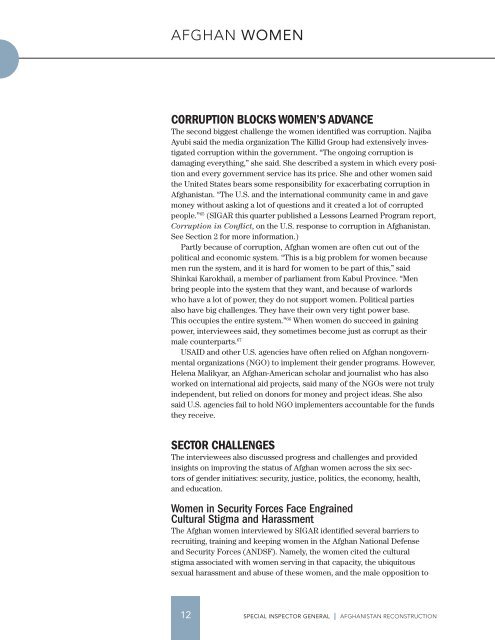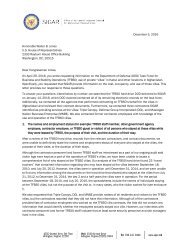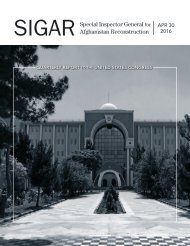SIGAR
2016-10-30qr
2016-10-30qr
Create successful ePaper yourself
Turn your PDF publications into a flip-book with our unique Google optimized e-Paper software.
AFGHAN WOMEN<br />
CORRUPTION BLOCKS WOMEN’S ADVANCE<br />
The second biggest challenge the women identified was corruption. Najiba<br />
Ayubi said the media organization The Killid Group had extensively investigated<br />
corruption within the government. “The ongoing corruption is<br />
damaging everything,” she said. She described a system in which every position<br />
and every government service has its price. She and other women said<br />
the United States bears some responsibility for exacerbating corruption in<br />
Afghanistan. “The U.S. and the international community came in and gave<br />
money without asking a lot of questions and it created a lot of corrupted<br />
people.” 65 (<strong>SIGAR</strong> this quarter published a Lessons Learned Program report,<br />
Corruption in Conflict, on the U.S. response to corruption in Afghanistan.<br />
See Section 2 for more information.)<br />
Partly because of corruption, Afghan women are often cut out of the<br />
political and economic system. “This is a big problem for women because<br />
men run the system, and it is hard for women to be part of this,” said<br />
Shinkai Karokhail, a member of parliament from Kabul Province. “Men<br />
bring people into the system that they want, and because of warlords<br />
who have a lot of power, they do not support women. Political parties<br />
also have big challenges. They have their own very tight power base.<br />
This occupies the entire system.” 66 When women do succeed in gaining<br />
power, interviewees said, they sometimes become just as corrupt as their<br />
male counterparts. 67<br />
USAID and other U.S. agencies have often relied on Afghan nongovernmental<br />
organizations (NGO) to implement their gender programs. However,<br />
Helena Malikyar, an Afghan-American scholar and journalist who has also<br />
worked on international aid projects, said many of the NGOs were not truly<br />
independent, but relied on donors for money and project ideas. She also<br />
said U.S. agencies fail to hold NGO implementers accountable for the funds<br />
they receive.<br />
SECTOR CHALLENGES<br />
The interviewees also discussed progress and challenges and provided<br />
insights on improving the status of Afghan women across the six sectors<br />
of gender initiatives: security, justice, politics, the economy, health,<br />
and education.<br />
Women in Security Forces Face Engrained<br />
Cultural Stigma and Harassment<br />
The Afghan women interviewed by <strong>SIGAR</strong> identified several barriers to<br />
recruiting, training and keeping women in the Afghan National Defense<br />
and Security Forces (ANDSF). Namely, the women cited the cultural<br />
stigma associated with women serving in that capacity, the ubiquitous<br />
sexual harassment and abuse of these women, and the male opposition to<br />
12<br />
SPECIAL INSPECTOR GENERAL I AFGHANISTAN RECONSTRUCTION




